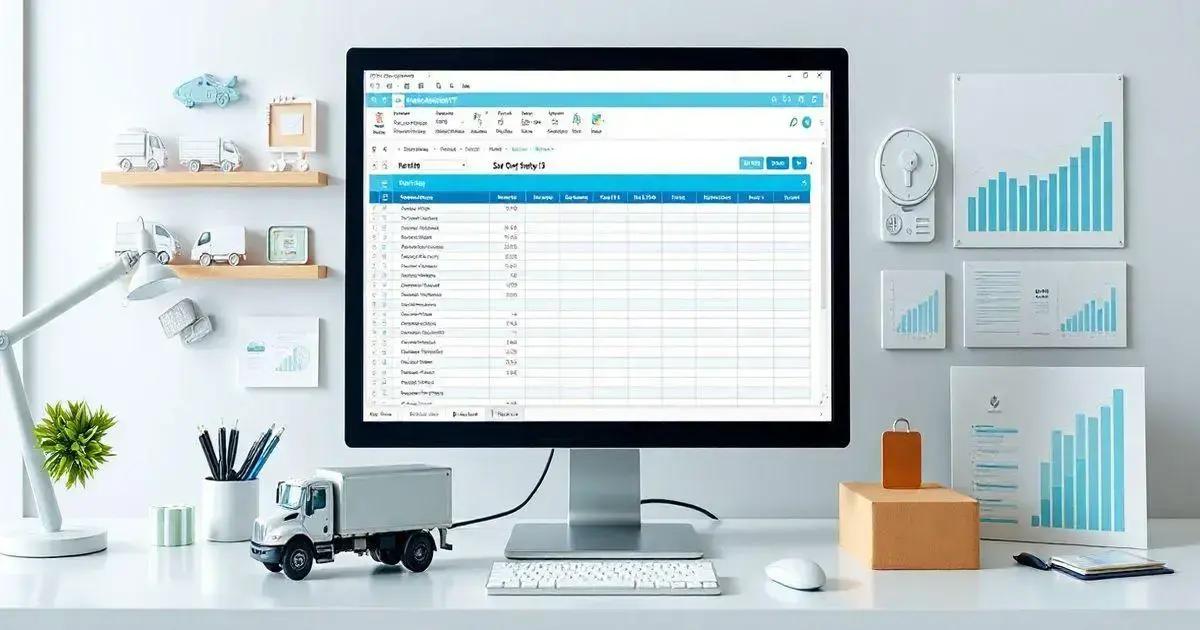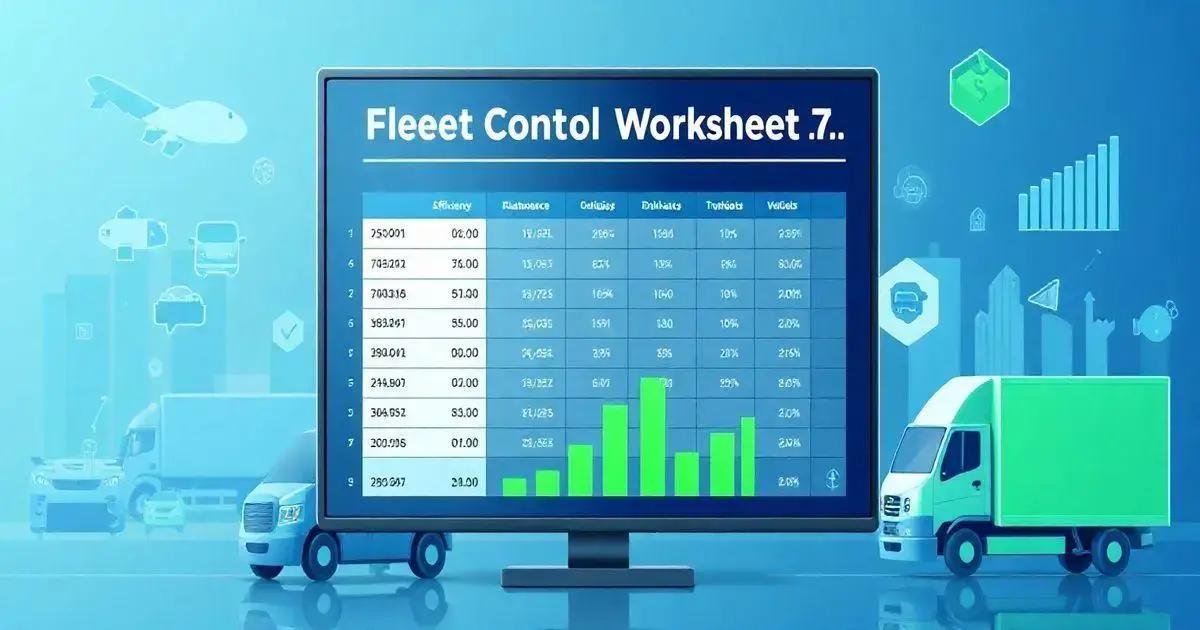Fleet Control Worksheet 7.0: Optimize Your Fleet Management Leave a comment
The Fleet Control Worksheet 7.0 is a vital tool for fleet managers, offering features like travel and maintenance tracking, tire control, and cost analysis through intuitive dashboards. It facilitates effective record keeping, enabling managers to optimize operations, reduce costs, and enhance vehicle management by making informed, data-driven decisions.
Are you looking to take your fleet management to the next level? Introducing the Fleet Control Worksheet 7.0, a comprehensive spreadsheet template that simplifies tracking and optimizing operations.
This user-friendly tool allows you to monitor travel, cargo, maintenance costs, and more, ensuring your fleet runs smoothly and efficiently.
Overview of Fleet Control Worksheet 7.0
The Fleet Control Worksheet 7.0 is an essential tool for anyone managing a fleet of vehicles, whether for a small business, a delivery service, or a large transport company. This worksheet is designed to streamline your fleet operations, offering features that help you track various aspects of vehicle management effectively.
With its intuitive layout and user-friendly interface, the worksheet allows fleet managers to easily input and access vital information about their vehicles. Key functionalities include:
- Travel Tracking: Keep a detailed log of distances traveled, fuel consumption, and other important metrics.
- Maintenance Scheduling: Plan and record preventive and corrective maintenance activities, ensuring that each vehicle is serviced on time.
- Cost Analysis: Analyze expenses related to fuel, repairs, and maintenance, helping you identify areas for cost-saving.
- Dashboard Overview: Access comprehensive dashboards that visualize performance metrics, such as fuel efficiency and overall maintenance costs, providing insights at a glance.
This worksheet not only saves time but also enhances decision-making capabilities, enabling managers to optimize operations and increase productivity. By implementing the Fleet Control Worksheet 7.0, you can ensure that your fleet is always in top shape, ready to meet the demands of your business.

Features and Benefits
The Fleet Control Worksheet 7.0 comes packed with a variety of features designed to enhance your fleet management experience. Each feature contributes to a smoother operation and helps you make informed decisions.
Key Features:
- Comprehensive Tracking: Monitor crucial metrics such as kilometers driven, fuel consumption, and costs associated with each vehicle.
- Preventive Maintenance Scheduling: Set schedules for regular maintenance, reducing the risk of breakdowns and extending the lifespan of your vehicles.
- User-Friendly Dashboards: Visualize key performance indicators through intuitive dashboards that allow for quick assessments of fleet performance.
- Detailed Registration Forms: Keep organized records of drivers, vehicles, maintenance services, and fuel usage, all in one centralized location.
- Cost Analysis Tools: Break down expenses by category, enabling better budgeting and financial decision-making.
- Document Management: Manage important vehicle documentation such as registrations and insurance in an easily accessible format.
Benefits:
- Improved Efficiency: By streamlining tracking and management tasks, you can focus on more strategic aspects of your fleet operations.
- Cost Savings: Regular maintenance and informed decision-making lead to significant reductions in overall operating costs.
- Enhanced Accountability: With detailed logs and records, accountability is improved among drivers and maintenance personnel.
- Data-Driven Decisions: Utilize the data collected through the worksheet to make informed decisions that support your fleet’s longevity and performance.
Overall, the Fleet Control Worksheet 7.0 not only simplifies the complexities of fleet management but also empowers you to operate more effectively and efficiently, ensuring that your fleet contributes positively to your bottom line.
Initial Dashboards
The Initial Dashboards of the Fleet Control Worksheet 7.0 provide a snapshot of your fleet’s performance and key metrics at a glance. These dashboards are designed to help fleet managers quickly assess the state of their operations without getting lost in the details.
Key Dashboard Components:
- Kilometers Driven by Driver: Track the total distance covered by each driver, allowing for performance evaluation and identifying driving patterns.
- Kilometers per Vehicle: Monitor the usage of each vehicle in your fleet, helping you identify underutilized resources or those that require more frequent maintenance.
- Kilometers per Liter: Calculate fuel efficiency for each vehicle, offering insights into which vehicles are performing best and which may need attention.
- Kilometers per Trip: Analyze average distance traveled per trip to optimize routes and improve delivery efficiency.
- Average Consumption per Vehicle: Provide a breakdown of fuel consumption per vehicle, enabling targeted actions to reduce costs.
- Total Maintenance Costs: Summarize all maintenance expenses to help you stay on budget and plan for future costs.
These dashboards not only enhance visibility into fleet operations but also empower managers to make data-driven decisions. With the Fleet Control Worksheet 7.0, you can easily spot trends, track vehicle performance, and ensure your fleet is operating at its best.

Record Keeping and Management
Effective Record Keeping and Management is a cornerstone of the Fleet Control Worksheet 7.0. This feature enables fleet managers to maintain accurate and organized records, ensuring that all essential information is readily available for review and analysis.
Key Aspects of Record Keeping:
Key Aspects of Record Keeping:
- Driver Registrations: Keep detailed records of all drivers, including their contact information, license details, and training certifications. This helps in tracking driver qualifications and ensuring compliance with legal requirements.
- Vehicle Type Registrations: Maintain a comprehensive log of each vehicle type within your fleet, including specifications, purchase dates, and warranty information. This assists in monitoring the lifecycle and performance of every vehicle.
- Maintenance Records: Document all maintenance work performed on each vehicle, including dates, types of services, and costs associated. This helps in identifying recurring issues and planning for future maintenance needs.
- Service Provider Management: Keep track of all workshops and suppliers used for vehicle maintenance and repairs, including contact details and service history. This ensures that you can easily reach out for services and assess service quality.
- Fuel and Expenditure Tracking: Record fuel purchases and other operational expenses related to each vehicle, enabling you to analyze spending patterns and identify opportunities for cost reduction.
By implementing robust record-keeping practices, fleet managers can ensure transparency, enhance accountability, and facilitate better decision-making regarding fleet operations. The Fleet Control Worksheet 7.0 simplifies this process, making it easy to maintain records and retrieve information as needed.
Travel and Tire Control
The Travel and Tire Control features of the Fleet Control Worksheet 7.0 are designed to enhance operational efficiency and ensure the safety and longevity of your fleet. By effectively managing travel logs and tire usage, fleet managers can optimize performance and minimize costs.
Key Components of Travel Control:
- Cargo Control Linked to Trips: Track cargo associated with each trip, allowing for accurate capacity management and accountability for delivered goods.
- Vehicle Control: Maintain records of vehicle assignments for each trip, ensuring that the right vehicle is used for the right job and minimizing the risk of wear and tear.
- Driver Control: Monitor which driver is assigned to each trip, facilitating better accountability and performance tracking.
- Supply Control: Keep a detailed log of supplies used during trips, from fuel to maintenance items, to understand costs and resource allocation better.
- Control of All Travel Expenses: Document and analyze all expenses incurred during trips, including tolls, fuel, and maintenance related to travel. This helps in budgeting and identifying unnecessary expenses.
Tire Control Features:
- Tire Identification: Assign unique identification to each tire, allowing for easy tracking of usage and maintenance history.
- Tire Change Schedule: Set schedules based on kilometers driven to ensure timely tire replacements, which is crucial for safety and performance.
- Remaining KM Indication: Use alerts for when tires approach their replacement thresholds, providing advance notice for timely changes.
- Status Tracking: Monitor the status of each tire, including allocation to vehicles, maintenance schedules, and any actions taken (such as removal or maintenance), ensuring optimal tire health.
By leveraging the Travel and Tire Control features, fleet managers can significantly improve operational efficiency, enhance safety, and extend the lifespan of both vehicles and tires. The Fleet Control Worksheet 7.0 empowers you to maintain control over these critical aspects of fleet management, providing insights that lead to more informed decisions.

Maintenance Control and Analysis
The Maintenance Control and Analysis capabilities of the Fleet Control Worksheet 7.0 are essential for ensuring that your fleet operates smoothly and efficiently. With these features, fleet managers can effectively track maintenance activities, analyze costs, and implement strategies to reduce downtime and extend the lifespan of vehicles.
Key Features of Maintenance Control:
- Type of Maintenance: Document the type of maintenance performed on each vehicle, including preventive and corrective measures. This helps in understanding the maintenance needs and patterns of each vehicle type.
- Maintenance by Vehicle: Keep track of maintenance history for each vehicle, allowing for tailored maintenance schedules based on specific usage and performance metrics.
- Mechanical and Electrical Maintenance Tracking: Log all mechanical and electrical work performed, providing a clear history that can be analyzed for recurring issues, ensuring timely interventions.
- Maintenance Cost Tracking: Record all costs associated with maintenance, enabling fleet managers to assess the financial impact of upkeep and make informed budget decisions.
- Preventive Maintenance Schedule: Create and manage a proactive maintenance schedule to minimize the likelihood of vehicle breakdowns. Alerts can be set to remind managers about upcoming maintenance due dates.
- Status Monitoring: Track the status of maintenance tasks, categorizing them as scheduled, accomplished, or delayed. This provides visibility into the effectiveness of maintenance operations and helps identify bottlenecks.
Analysis Tools:
- Yearly Analysis: Analyze maintenance data over the year to identify trends in costs and types of repairs needed, which can inform budgeting and purchasing decisions.
- Cost Comparison: Compare maintenance costs against operational data to assess the overall efficiency of the fleet and identify savings opportunities.
- Performance Metrics: Utilize collected data to generate performance metrics for maintenance operations, assisting in decision-making and operational improvements.
With the Maintenance Control and Analysis features, fleet managers can maintain high standards of vehicle operation, reduce unexpected repair costs, and ensure that the fleet remains compliant with safety regulations. The Fleet Control Worksheet 7.0 not only simplifies these processes but also provides valuable insights that can lead to more strategic fleet management practices.
Conclusion
In conclusion, the Fleet Control Worksheet 7.0 is an invaluable resource for fleet managers seeking to enhance their operational efficiency and optimize vehicle management.
With features such as comprehensive record keeping, travel and tire control, and maintenance analysis, this worksheet empowers managers to make informed, data-driven decisions that ultimately improve fleet performance.
By utilizing this tool, you can track vital metrics, streamline maintenance schedules, and analyze costs effectively, ensuring that your fleet remains in top condition.
Whether you manage a small fleet or a large operation, the Fleet Control Worksheet 7.0 provides the insights and control necessary to drive success and maintain a competitive edge in the industry.
Investing time in optimizing your fleet management processes with this worksheet will not only save you money but also enhance productivity, safety, and accountability across your operations.
Start taking control of your fleet today!
FAQ – Frequently Asked Questions about Fleet Control Worksheet 7.0
What is the Fleet Control Worksheet 7.0?
The Fleet Control Worksheet 7.0 is a comprehensive spreadsheet tool designed to help fleet managers track vehicle performance, maintenance, fuel consumption, and various operational metrics.
How can I track maintenance with this worksheet?
You can log all types of maintenance activities performed on each vehicle, schedule preventive maintenance, and monitor costs associated with repairs and upkeep.
Is the worksheet user-friendly for non-technical users?
Yes, the worksheet is designed with an intuitive layout, making it accessible for users with varying levels of technical expertise.
Can I customize the worksheet to fit my fleet’s specific needs?
Absolutely! The Fleet Control Worksheet 7.0 can be customized to include specific metrics or features based on your fleet’s unique operational requirements.
What types of reports can be generated from the data?
The worksheet allows you to generate performance reports, cost analyses, and maintenance summaries, helping you make informed decisions about your fleet operations.
Is there a customer support option available for users?
Yes, technical assistance is available via email or WhatsApp during specified business hours to help with any issues or questions.

